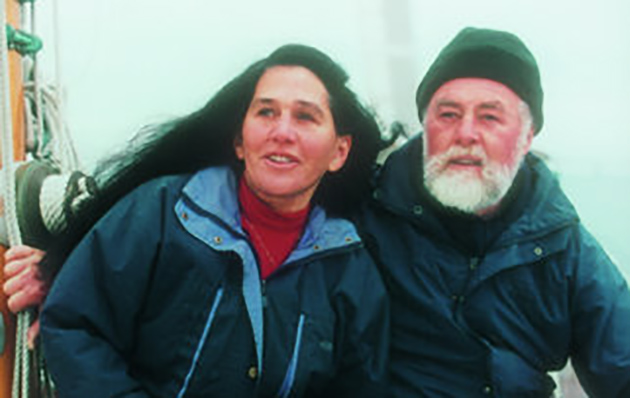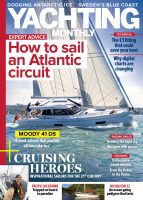Ever dreamed of giving up the rat race and working remotely from the deck of your yacht? Elena Manighetti and Ryan Osborne explain how they earn an income from their laptops while cruising full time
We’d spent months soul searching, thinking of ways to quit the rat race but still make enough money to live more adventurous lives, writes Elena Manighetti.
In the summer of 2016, on holiday, Ryan and I found ourselves on a beautiful beach in Mallorca.
Suddenly, the answer to our questions was right in front of us: a charming yacht anchored in the bay.

Elena and Ryan have now sold their Heavenly Twins 26 and are exploring the Caribbean on a Tayana 37. Credit: Sailing Kittiwake
On that day, we promised each other we’d look into the possibility of going cruising and earning money while sailing.
We spent the next few months reading cruising magazines, looking at boats for sale and devouring sailing-related books.
Exactly a year later, in May 2017, we cast off the lines and started living our dream.
Living the nomad lifestyle and still be able to earn money
We’d heard the buzzwords ‘digital nomad’ before but had never thought much of it.
As soon as we looked into the phenomenon, we realised that any laptop-based freelance job could be done remotely.
We grew more and more confident that cruising while young, on a low budget, working along the way ‘Pardey style’ was a very real possibility.

Lin and Larry Pardey have written 12 books at sea
Lin and Larry Pardey led the very same lifestyle from the 1970s onwards, sailing around the world while earning a living in different ports through writing.
They didn’t have it easy back then – they had to find work in each country, fill in the paperwork, wait months at a time to cash in their cheques and post off hundreds of pages of their precious work in foreign post offices.
This remarkable couple is just one example of the working cruising community.
All over the world, there are average people leading normal lives on the water while making a livelihood – from delivery captains and social media managers, to handymen and accountants.
While sailing in Western Europe, Ryan and I met other working cruisers who were earning enough money to follow their dreams.

Ryan edits the couple’s YouTube videos. Credit: Sailing Kittiwake
They were either finding employment in new countries for a few months a year onshore as builders, acupuncturists and dentists or they were working from their boats as writers, beauticians and web developers.
Some lived frugally off passive income, such as renting their home.
Today’s technological advancements make this lifestyle even more achievable.
This means it’s possible to work on the go, even while underway, rather than having to stop in a specific port when money runs low.
It’s a huge advantage and makes life on board much easier.
With housing prices rising steadily, remote jobs becoming easier to obtain, the growing phenomenon of minimalism and the huge popularity of YouTube sailing channels, we believe more and more young people and families will soon move on to the water.
Buying the boat
When we started searching for the perfect boat, we didn’t have a big budget.
A little research showed it didn’t matter – there were sturdy, well-built glassfibre boats from the ’70s and ’80s sitting on mooring buoys or parked in boatyards all over the UK, waiting to be loved again.
We initially looked at a mix of monohulls and catamarans – Westerlies, Prouts, Contessas, and Heavenly Twins.

One of the advantages of a small catamaran is being able to beach it to dry out. Credit: Sailing Kittiwake
Eventually, we settled on our Heavenly Twins 26 catamaran, Kittiwake.
The space, comfort, and downwind performance this little boat offered were incomparable with monohulls of the same price (under £10K).
We especially liked the safe centre cockpit, the shallow draft, the seaworthy low profile and the small rig.
It was the perfect first boat for a couple learning to sail.
Setting up our freelance jobs
Although we saved enough money to sustain ourselves for a year and set a contingency fund aside, I hated the idea of setting off on our cruise without an income.
Five months before our departure date, I started looking for potential clients.
Hunting for work in my field as a content marketer made things easier – I could use my experience, personal connections, and LinkedIn.
Three months later I had two fixed clients and I was earning a modest second salary (enough to pay the bills), so I quit my day job.

The couple’s solar panels total 560W giving them plenty of power for their laptops and mobiles. Credit: Sailing Kittiwake
The time spent building my business on shore was worth every weekend I worked. It meant I had a fairly reliable income.
On the other hand, Ryan, being a civil engineer, had to reinvent himself.
He had a passion for design, so taught himself to code.
Now he takes on web design and practical boat work projects.
He also edits the videos we produce – tips and tricks vlogs, as well as episodes about our sailing adventures – which we publish on YouTube to earn extra money.
Building the ‘Sailing Kittiwake’ brand through our YouTube channel and blog has also helped us find more writing and design work.
We believe the best way to build a steady income is to set up a number of streams of revenue.
This way, should a client drop out or not pay on time, money is still coming in.
Learning to love anchoring
Living at anchor was always our plan, so we prepared ourselves and the boat for it and we got used to it from day one.
We’re almost completely independent from shore – the only things we need are food and water.
We have plenty of solar panels (560W), we can get online through our phones and we enjoy showers on board.

Anchoring for long periods gives the couple time to work online using mobile data. Credit: Sailing Kittiwake
If we wanted to, we could provision, stock up on water and live at anchor for a month without going ashore.
We don’t feel living on the hook is at all a sacrifice.
We enjoy all aspects of it: privacy, the views, swimming and exploring in the dinghy.
The key to learning to love anchoring is doing it often so it becomes the norm.
Getting online
We predominantly use our mobile phones as hotspots and occasionally go to shore to use WiFi if we suffer from cabin fever.
A 4G mobile connection with good signal is generally faster than a standard public WiFi.
This means that even uploading big files, such as videos, is much faster (about a tenth of the time) on a mobile network.
For this reason, we choose to invest in mobile data packages rather than multiple drinks out at a café.

A WiFi booster helps you make the most of the signal from shore
It’s more cost efficient and we feel far more productive in a quiet anchorage than in a busy beach bar.
We own and use a total of four SIM cards from different countries at the moment.
Next year we plan to work more underway during our off-watches so we can have more free time at anchor.
As most of our sailing is coastal, we often have good reception.
With a dry centre cockpit and no heeling, it’s easy to work from a laptop.
Adapting to the liveaboard lifestyle
Our change from landlubbers to cruisers was a gradual one.
We lived on and off the boat since we bought it.
Once we set off, it was easy to adapt to our brand new lives, also thanks to the research we did before hand.
We’ve had a couple of wobbles since leaving Falmouth.

Being able to creep into shallow water has opening up many more anchorages. Credit: Sailing Kittiwake
We found ourselves in a storm in the Isles of Scilly, where we had to relay a Mayday call for a vessel that was sinking nearby.
We also learned the hard way that fishing boats rarely respect collision regulations by very nearly colliding with one.
These lessons have proved invaluable.
We’re grateful we’ve come out of some difficult situations unscathed and wiser.
Earning money while you cruise
Working remotely from a sailboat means meetings become Skype calls, updates turn into online chats and briefs into emails.
Communication might be slightly delayed due to a potential time difference, so it’s best to look for flexible clients and seek projects that aren’t very urgent.
Passage planning needs to take work into account too.
Having to earn money while sailing can be challenging at times.
We sometimes can’t take advantage of a good weather window due to an impending deadline.

A sold tender that was easy to row was invaluable for work breaks. Credit: Sailing Kittiwake
The other limitation we have is that we aren’t confident venturing to less-populated areas in case the mobile networks are weak and sparse.
We aren’t planning any ocean passages yet either, but if we do we’ll have to discuss time away with our clients.
When work is stressful, sitting in a small space can feel suffocating.
If we start showing signs of burnout, we go for a row in the dinghy or a walk ashore.
Worth the sacrifices

Elena Manighetti is a marketer, writer and vlogger who is sailing longterm with her partner Ryan. Credit: Sailing Kittiwake
While we recognise we have some limitations, we feel that working keeps us busy, active, and focused.
It may slow us down from time to time but it means we have a chance to get to know places and people better.
Working while cruising is ultimately the only reason why we can afford to live on a sailboat.
We believe the effort and compromises involved are definitely worth the slower pace of life, the sight of dolphins playing with our bows, the sundowners shared with likeminded cruisers and the freshly caught fish eaten in front of a beautiful sunset.
To follow Elena and Ryan’s adventures, visit: sailingkittiwake.com and youtube.com/c/sailingkittiwake
Get online at anchor
There are a number of ways to connect to the internet from a yacht…
- Use your mobile contract’s data allowance or buy an international top-up and use the phone as hotspot.
- Purchase local mobile SIM cards or dongles with good data packages to use as hotspots.
- Install a WiFi booster on your mast to catch networks from shore.
- Purchase a Fi-ready phone to use Google’s Project Fi to use one SIM card to access the internet worldwide.
- Or, try an Apple SIM card to buy local mobile data packages around the world from your iPad.
- If you’re new to working online, visit the Digital Nomad Community website to find helpful resources and connect with other nomadic workers. You can also join the Global Digital Nomad Network group on Facebook, where members often share useful articles and job openings.
Anchoring long term
- Set up a powerful electrical supply. Our solar panels total 560W and the batteries have 225A hours of storage. This allows us to run nav instruments, a small fridge and the autopilot, plus charge laptops, mobiles and cameras.
- Work out how to get water reliably using apps like OpenSeaMap to find sources on shore, or get a watermaker.
- Invest in an oversized anchor for a good night’s sleep. We use a 22kg Manson Supreme with 35m of 8mm chain and 50m of 14mm nylon rode.
- Fit a bright anchor light coupled with a cockpit light to avoid potential collisions with other boats motoring around an anchorage in the dark.
- Buy a dinghy that’s easy to store, launch and row. We have an 8ft Walker Bay which is light and great to row.
Jobs to work remotely from your boat
- Freelance writer or journalist
- Digital marketer
- Translator
- Web or graphic designer
- Virtual assistant
- Language tutor
- Running an online shop or affiliate marketing
- Photographer of videographer
- Consultant in your field
- Social media manager
- Affiliate marketer
- Canvas work tailor
- Boat maintenance contractor
- Sailing instructor
Enjoyed reading How to earn money while you sail?
A subscription to Yachting Monthly magazine costs around 40% less than the cover price.
Print and digital editions are available through Magazines Direct – where you can also find the latest deals.
YM is packed with information to help you get the most from your time on the water.
-
-
- Take your seamanship to the next level with tips, advice and skills from our experts
- Impartial in-depth reviews of the latest yachts and equipment
- Cruising guides to help you reach those dream destinations
-
Follow us on Facebook, Twitter and Instagram.





